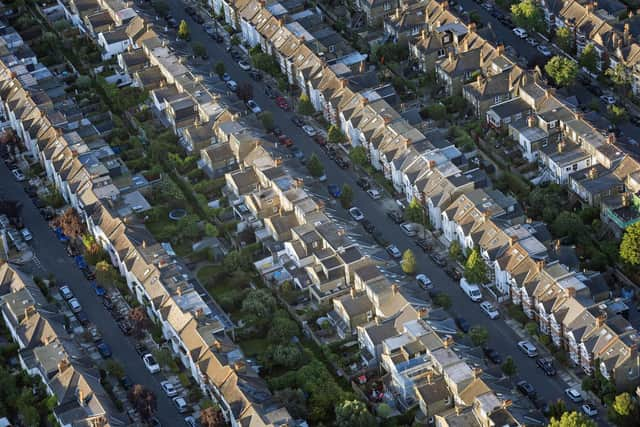September figures show that house price growth stalled month-on-month as experts warn ‘the level of uncertainty in the property market is off the scale’
and live on Freeview channel 276
Estate agents said that there could be some re-negotiations amid a backdrop of rising interest rates – and if this turns into a trend it could soften house prices.
Across the UK, the average house price in September was £272,259, Nationwide Building Society said.
Advertisement
Hide AdAdvertisement
Hide AdProperty values recorded 0.0 per cent growth month-on-month, following a 0.7 per cent monthly increase in August.


The annual price increase of 9.5 per cent was slightly more modest than a 10.0% annual increase recorded in August.
Robert Gardner, Nationwide’s chief economist, said: ‘In September, annual house price growth slowed to single digits for the first time since October last year, although, at 9.5 per cent, the pace of increase remained robust.
‘Prices were unchanged over the month from August, after taking account of seasonal effects. This is the first month not to record a sequential rise since July 2021.
Advertisement
Hide AdAdvertisement
Hide Ad‘There have been further signs of a slowdown in the market over the past month, with the number of mortgages approved for house purchase remaining below pre-pandemic levels and surveyors reporting a decline in new buyer inquiries.
‘Nevertheless, the slowdown to date has been modest and, combined with a shortage of stock on the market, this has meant that price growth has remained firm.’
Stamp duty cuts were made in last week’s mini-budget.
However, many mortgage products have been pulled in recent days amid economic uncertainties and lenders have been pricing their mortgages upwards, spelling higher costs for borrowers.
Mr Gardner added: ‘By lowering transaction costs, the reduction in stamp duty may provide some support to activity and prices, as will the strength of the labour market, assuming it persists, with the unemployment rate at its lowest level since the early 1970s.
Advertisement
Hide AdAdvertisement
Hide Ad‘However, headwinds are growing stronger suggesting the market will slow further in the months ahead.
‘High inflation is exerting significant pressure on household budgets with consumer confidence declining to all-time lows.
‘Housing affordability is becoming more stretched. Deposit requirements remain a major barrier, with a 10 per cent deposit on a typical first-time buyer property equivalent to almost 60 per cent of annual gross earnings – an all-time high.
‘Moreover, the significant increase in prices in recent years, together with the significant increase in mortgage rates since the start of the year, have pushed the typical mortgage payment as a share of take-home pay well above the long-run average.’
Advertisement
Hide AdAdvertisement
Hide AdNationwide also released quarterly house price figures showing movements across the UK.
Nathan Emerson, chief executive of estate and letting agents’ body Propertymark, said: ‘Our own data from our estate agent members across the UK shows the number of new homes and buyers coming to the market is up year-on-year, which will underpin stability.
‘With interest rate rises, we could start to see some re-negotiations if mortgage offers expire during the conveyancing process, which is currently taking over 17 weeks on average.
‘A trend of re-negotiation would start to soften house prices as those final sale prices are used by agents to create comparable evidence for the valuing of new properties entering the market.’
Advertisement
Hide AdAdvertisement
Hide AdMark Harris, chief executive of mortgage broker SPF Private Clients, said: ‘So much has changed even since the beginning of September.
‘Lenders have been pulling fixed-rate mortgages left, right and centre as swap rate volatility makes them extremely difficult to price.
‘Many of the smaller lenders in particular are waiting to see what the market does before relaunching.’
He added: ‘Borrowers concerned about their mortgage should seek advice from a broker as to the options available and plan ahead as much as possible.’
Advertisement
Hide AdAdvertisement
Hide AdGabriella Dickens, senior UK economist at Pantheon Macroeconomics, said: ‘The latest data from Nationwide suggest the staggering jump in mortgage rates finally is starting to weigh on buyer demand.
‘The increase in the stamp duty land tax threshold to £250,000, from £125,000, will do little to offset affordability issues caused by the upcoming surge in mortgage rates.’
Tomer Aboody, director of property lender MT Finance, said: ‘We will see a shift in sentiment and the move to a buyers’ market, rather than sellers calling the shots.
‘Prime properties, especially within the London area, should sustain values, as foreign buyers look to take advantage of the weaker pound.’
Advertisement
Hide AdAdvertisement
Hide AdAndrew Montlake, managing director of mortgage broker Coreco, said: ‘The days of double-digit growth may not return for a long time.
‘The level of uncertainty in markets, and being felt by consumers, is off the charts.
‘The brief surge in sentiment caused by the stamp duty announcement on Friday has been wiped out by the tsunami of market volatility since.
‘There’s no doubt now that a lot of prospective buyers will either have to look at smaller homes due to the sharply increased mortgage rates they are now looking at, or will shelve their plans altogether and wait until there is more clarity and things have calmed down.
Advertisement
Hide AdAdvertisement
Hide Ad‘Prices will without doubt come under real pressure now, but the sizeable drops some have predicted are unrealistic given the lack of supply. Prices are far more likely to flatline than go through the floor.’
Ross Boyd, founder of mortgage comparison platform Dashly.com, said: ‘After the chaos of the past week, the level of uncertainty in the property market is off the scale.’
According to Nationwide, the average house prices in Fareham and Portsmouth in the third quarter of this year is £353,276, and the annual increase is 10.4 per cent.

